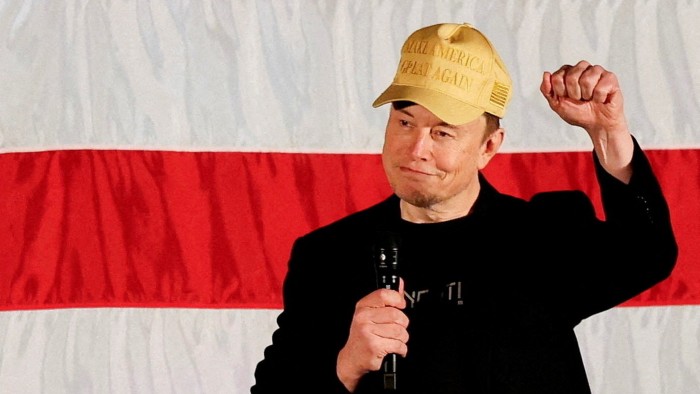Elon Musk’s mission to slash US federal spending for Donald Trump is winning over a surprising cohort in Washington: Democrats who eye a chance to reduce defence spending and cut red tape.
Senior politicians including senators Bernie Sanders and John Fetterman and a growing number of Democratic House members have expressed support for parts of Musk’s government efficiency crusade, which includes a pledge to cut $2tn from annual spending.
“Defence contractors have been fleecing the American people for far too long,” Ro Khanna, a California Democrat whose district includes parts of Silicon Valley, told the Financial Times. Khanna said he was “willing to work with [Musk] to rein in wasteful spending at the Pentagon”.
The influential congressman’s comments came after Sanders ignited a row among Democrats by saying Musk was “right” to target defence expenditure.
“The Pentagon, with a budget of $886bn, just failed its seventh audit in a row. It’s lost track of billions,” the Vermont senator, who has long campaigned against the corruption of what he calls the “military-industrial complex”, wrote recently. He added that only 13 senators voted against “a defence budget full of waste and fraud” and “that must change”.
Musk, tasked with Trump to co-lead a new Department of Government Efficiency, has floated plans to close entire agencies and fire hundreds of thousands of civil servants, drawing ire from critics on the left.
The X, Tesla and SpaceX boss’s rise to the heart of Trump’s circle, coupled with his support for rightwing causes around the world, has made some on the left increasingly fearful of his power and sceptical of his political agenda.
But Sanders, an icon of the progressive movement, also appeared to endorse the billionaire’s complaints about healthcare costs in the US, albeit from a different perspective. “We waste hundreds of billions a year on healthcare administrative expenses that make insurance CEOs and wealthy stockholders incredibly rich,” the senator said.
Fetterman, a Democratic senator from Pennsylvania, recently expressed his admiration for Musk, saying the Tesla boss had “made our economy and our nation better”. Musk said it was “hard not to like” the senator.
Florida representative Jared Moskowitz this month became the first Democrat to join a Doge caucus in the House of Representatives, saying that the Department of Homeland Security had “gotten too big”. Ohio Democratic representative Greg Landsman also joined the group, saying you “wanna be in the room” where discussions about government spending were happening.
Moskowitz attended the inaugural meeting of the Doge caucus on Capitol Hill in mid-December, alongside Democrats Steven Horsford and Val Hoyle.
Hoyle, who represents a district in Oregon, justified her decision to join the group by saying “anyone who thinks there aren’t opportunities to make government more efficient and effective is not living in the real world”. Doge was “not a partisan issue”, she said.
Horsford, who represents a district in Nevada, said he attended the caucus meeting to “have a seat at the table during conversations about streamlining government programmes and cutting waste”.
Democrats have also tried to delineate where they differ from Musk’s vision.
Khanna told the FT he would “fiercely oppose any cuts to the Environmental Protection Agency, Consumer Financial Protection Bureau, or programmes such as Medicare, social security and benefits for veterans”. Horsford said he appreciated “that Republicans have made clear [at the caucus meeting] they will not propose cuts” in such areas.
Hoyle said that while she supported “allowing Medicare to negotiate drug pricing or cracking down on defence contractors”, she was strongly opposed to cuts to programmes Americans rely on, including social security, the postal service and the FAA.
Don Moynihan, a public policy professor at the University of Michigan, said of Musk’s $2tn target that “the math doesn’t really add up” unless he cuts social security, Medicare and veterans’ affairs. Together they account for approximately two-thirds of the US’s $6.5tn government budget.
To meet its aims, Doge would have to “go after a good chunk of not just military spending but safety net spending”, Moynihan said. “You simply can’t get to $2tn without draconian cuts across government including very popular services like veterans’ administration.”
Democratic strategist Julie Roginsky questioned the political wisdom of supporting Doge, which Musk will be running alongside former presidential candidate Vivek Ramaswamy, another wealthy entrepreneur and “anti-woke” advocate.
“You have two inexperienced billionaires who are effectively trying to take a sledgehammer to government, that funds very popular programmes,” she said. “I don’t think Democrats should be anywhere near that.”
Source link









